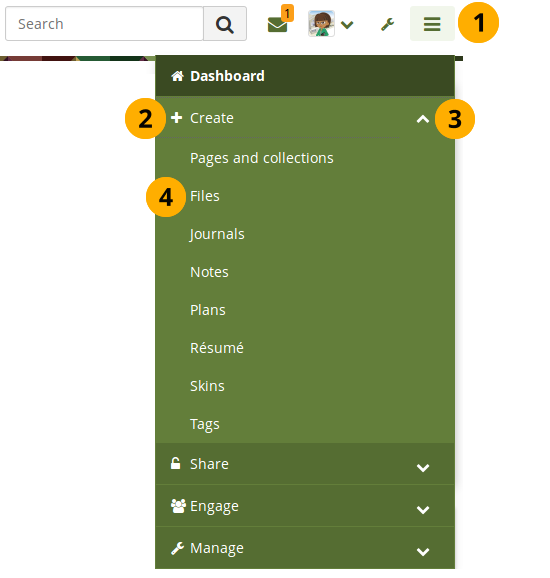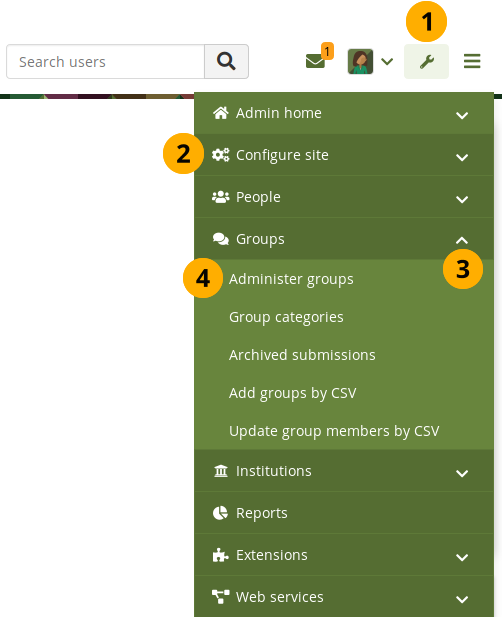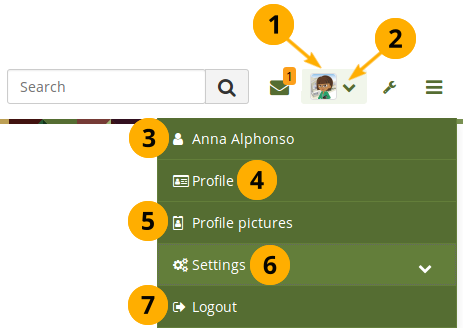3. Dashboard¶
3.1. Login¶
3.1.1. Regular login form¶
You always need a login to authenticate yourself and access your personal information, portfolio pages and groups that you belong to. You can log in on the Mahara homepage.
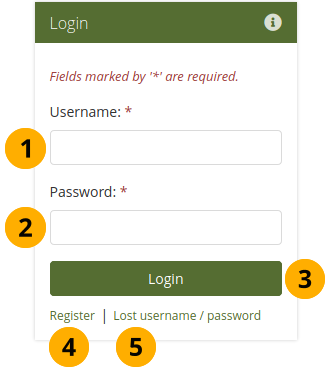
Regular login form¶
Username: Type your username in this field (not for SSO or Moodle accounts).
Password: Provide your password. If you enter your password incorrectly 5 times in a row during one session, access is locked for 5 minutes before you can try again.
Click the Login button to access your account.
Register: If you do not have an account, and your institution allows self-registration for an account, use this link and follow the instructions on the next page.
Lost username / password: If you do not remember your username or password to your account, click this link to be taken to a page where you can request an email with your details. It will contain your username and a link to change your password.
Note
The regular login form is only available for internal and LDAP accounts. Internal accounts are accounts for which you registered through your Mahara site or that were created by administrators either manually, or by a CSV file upload.
The ‘Lost username / password’ link only works for internal accounts where you use the regular login form.
If you log in via SSO or Moodle for example, you must retrieve your password directly from these services. If you do not know how to do that, please ask your administrator.
You can hide the login form entirely from the homepage if your Mahara instance generally only connects to an external authentication method such as MNet or CAS. In these cases, people will need to log in via a different site and seeing the login form on the homepage may only be confusing.
Once you have hidden the login form, only a link to it is displayed on the homepage for an administrator to log into the site.

Link to the login form¶
3.1.2. SSO login¶
When you log in via single sign-on, you do not use the regular login form, but you need to log in via the IdP. Therefore, a special SSO button is needed. The SSO button is displayed more prominently to make it easier for people to choose the correct authentication method.
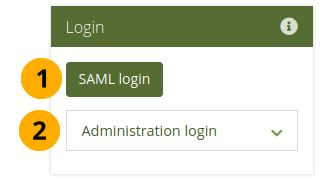
Login form for SSO¶
SAML login: If you log in via your institution’s SSO (single sign-on) account, please use this button to be taken to the SSO login.
Administration login: When you click this panel, you can see the regular login form to get into Mahara without an SSO account.
The SSO button is labelled with the display name of the institution. If that is too long or you want to display something else on the button for another reason, you can create a /htdocs/local/lang/en.utf8/auth.saml.php file and add it there. The button needs to have the key ‘login’ + shortname of the institution, e.g. for ‘testinstitution’ it would be: $string['logintestinstitution'] = 'Special label';
See also
Find out more about making language adjustments in Mahara.
3.2. Login with strict privacy¶
When the site administrator turned on strict privacy, you need to consent to the terms and conditions and the privacy statement of the site and maybe even an institution if you are a member of an institution before you can enter your account. If you don’t, you have the opportunity to discuss your issues with them with an administrator.
Note
When any of the statements changed, you will be presented with them again and need to make a decision about consenting or not.
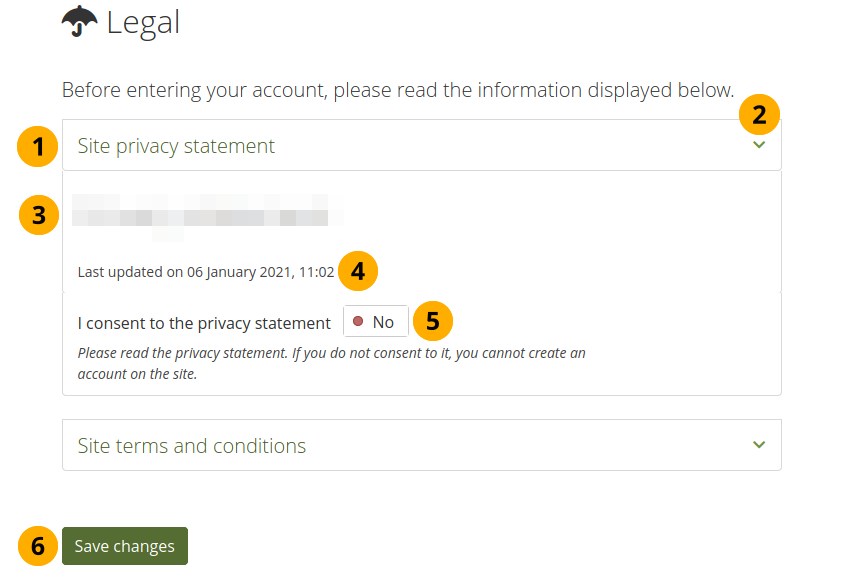
Accept legal statements upon first login¶
Title of the legal statement.
Note
There can be up to 4 statements that you may need to consent to. This depends on the setup of the site that you use.
Click the Retractable icon to close this section. This is helpful if the texts are very long.
The text of the statement.
The date the statement was last updated is displayed.
If you consent to the statement, flip the switch to ‘Yes’.
Note
Before you consent to a statement, please read it carefully. If you do not understand a section or have questions, do not consent to it but leave it set to ‘No’. When you save your changes, you will have the opportunity to detail why you do not consent and get in touch with the administrator to discuss your concern.
Click the Save changes button to accept your decisions.
3.3. Overview¶
You can change certain aspects of your dashboard, namely the personal information, but a lot of what you see is static to allow you to quickly access other parts of Mahara.
Only you can see your dashboard. Nobody else has access to it.
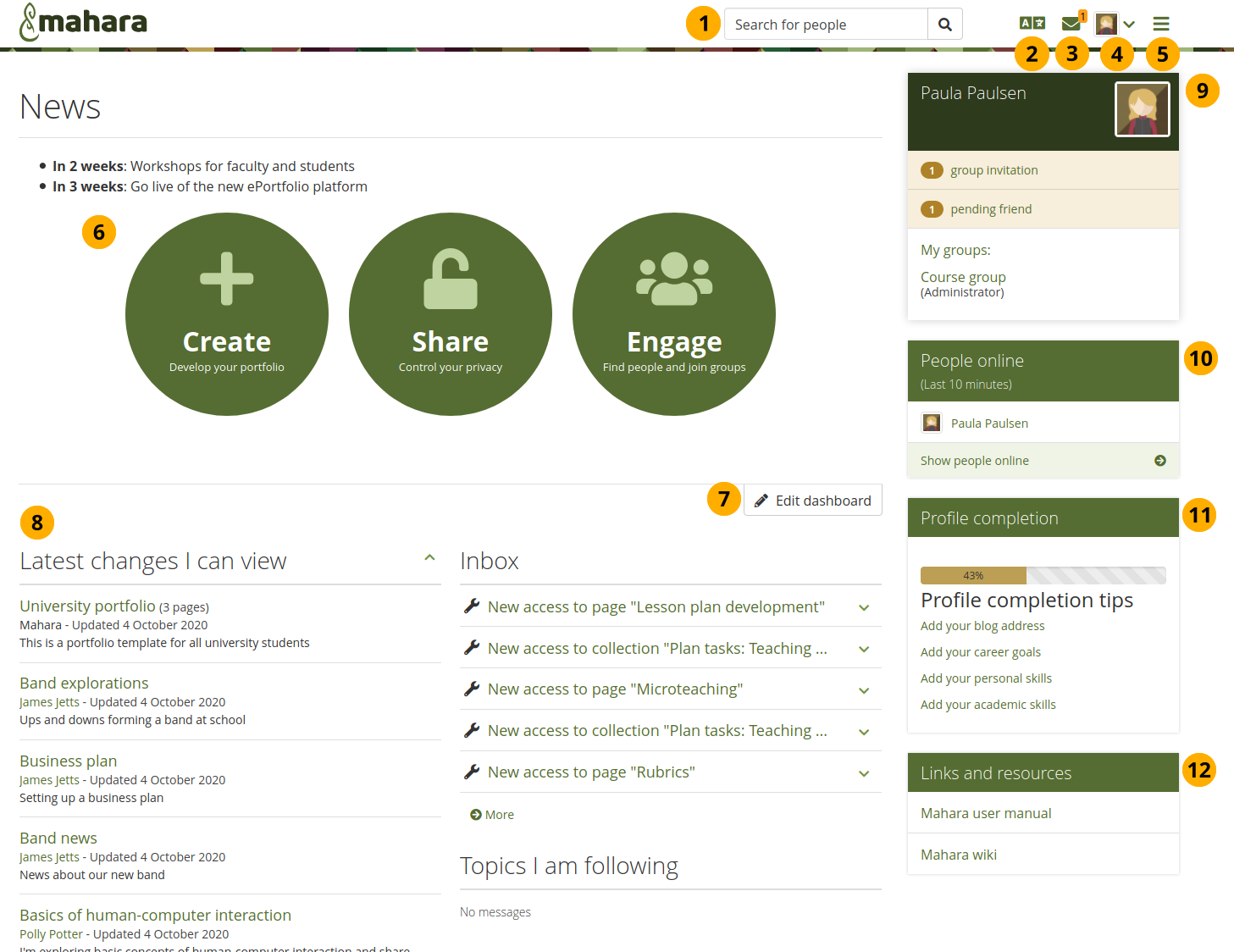
Your homepage is your dashboard from which you can access a number of areas in Mahara conveniently.¶
Search for people: Search for people who have an account to view their profile page and check which portfolios they have made accessible to you. If your site has fulltext search available, you can search for anything on the site using this search box.
Note
In the People search box you can most often search for a person’s display name. Depending on the settings that the site administrator made, you may also be able to search for their real name and username. If the site administrator allowed account holders to hide their real name, you can do so in your general account options.
To provide you with the most relevant search results, you automatically search only for people within your own institution, but can choose to search for everyone on your Mahara installation on the ‘People’ page you are taken to.
If the site administrator turned on exact people search, you need to provide the correct display name or real name in order to find another person.
Click the Language chooser icon to switch to another language that is installed on the site.
Note
The icon is only visible when there is more than one language available on the site.
When the icon is clicked, the page is reloaded. Thus, if you wrote some text, you’ll be asked if you want to leave the page or not to prevent that your text will be lost.
Inbox: Click the Inbox icon to view all your notifications and send messages.
Account menu: Click the Account menu navigation icon to reach your account settings, profile, profile pictures, legal statements, connected apps, notification settings, and the logout link, or click your profile picture to be taken to your profile page.
Main menu: Use the Main menu navigation icon to navigate to other areas of your portfolio.
Note
Administrators and staff who have access to the administration area, see the Administration menu navigation icon in addition to the main menu navigation so they can navigate within the administration area.
Quick links: These quick links take you directly to certain areas of Mahara.
Note
You can remove these quick links (or similar elements if the instance of Mahara you are using has some other content in there) in your general account options, option ‘Dashboard information’.
Edit dashboard: The Edit dashboard button allows you to jump directly into the edit screen for your dashboard without having to go to Main menu → Create → Pages and Collections first.
Note
You cannot add a skin to your dashboard page.
You can customise this area on your dashboard to put blocks there that you want to see every time you log in.
This sidebar block contains static and dynamic information:
Your name is linked to your profile page.
Your profile picture is linked to your profile pictures page where you manage your profile pictures.
If you are a member of any groups, they are displayed here. You can shorten the list by only displaying labelled groups.
Pending friend requests and group invitations are displayed.
If you tagged artefacts or pages with the tag ‘profile’, a link to them is placed here.
Show who is online: If this sidebar block is enabled, you see people who have been logged in during the last 10 minutes. Depending on the settings for your institution that the administrator chose, you may see everyone, only people from your institution(s), or nobody at all.
Profile completion: You see this sidebar block if your site or institution administrators turned on the profile completion functionality.
Links and resources: List of links to websites or documents that are visible to all logged-in people or the public.
3.5. Quick links¶
When you log in to Mahara, you see three new boxes with quick links:
Create: Create your electronic portfolio in a flexible personal learning environment. This takes you to Main menu → Create → Pages and collections.
Share: Share your achievements and development in a space you control. Clicking on this box takes you to Main menu → Share → Shared by me.
Engage: Engage with other people in discussion forums and collaborate in groups. This takes you to Main menu → Engage → Groups.

Mahara usage information and information when you hover over a box with your cursor¶
With the help of these quick links you can reach the different parts of your portfolio directly from your dashboard.
Note
If you removed these boxes from your dashboard but want to get them back at a later point, you can re-active them under Account menu → Settings → Preferences → Dashboard information.
If you do not see the dashboard boxes and do not have the option to turn this setting on, your site administrator disabled this feature in the site configuration.
3.6. Personal information¶
The default dashboard includes the following blocks:
Portfolios shared with me
My portfolios
Inbox
Topics I’m following
These blocks are filled with content once you start using Mahara and create pages, receive messages from others, have access to others’ portfolio pages and use the forums for discussions. You can customize these blocks to your liking by editing your dashboard. Click the Edit dashboard button directly on your dashboard or go to Portfolio in the navigation menu, click the Edit button next to the dashboard page and change the blocks like you would change them on any page in Mahara.
See also
Refer to the section ‘Add content to a page’ for more information on adding and removing blocks from a page.
The site administrator can change the default blocks on the dashboard page for new account holders in Administration → Configure site → Pages.
